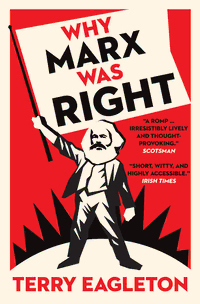
Why Marx Was Right PDF
Preview Why Marx Was Right
Why Marx Was Right Why Marx Was Right TERRY EAGLETON New Haven & London Published with assistance from the Louis Stern Memorial Fund. Copyright ∫ 2011 by Yale University. All rights reserved. This book may not be reproduced, in whole or in part, including illustra- tions, in any form (beyond that copying permitted by Sections 107 and 108 of the U.S. Copyright Law and except by reviewers for the public press), without written permission from the publishers. Yale University Press books may be purchased in quantity for educational, business, or promotional use. For information, please e-mail sales.press@ yale.edu (U.S. office) or [email protected] (U.K. office). Designed by James J. Johnson and set in Granjon Roman type by Keystone Typesetting, Inc. Printed in the United States of America. Library of Congress Cataloging-in-Publication Data Eagleton, Terry, 1943– Why Marx was right / Terry Eagleton. p. cm. Includes bibliographical references and index. isbn 978-0-300-16943-0 (hardcover : alk. paper) 1. Marx, Karl, 1818–1883. 2. Communism. 3. Capitalism. I. Title. hx39.5e234 2011 335.4—dc22 2010041471 A catalogue record for this book is available from the British Library. This paper meets the requirements of ANSI/NISO Z39.48–1992 (Permanence of Paper). 10 9 8 7 6 5 4 3 2 1 For Dom and Hadi Contents Preface ix Chapter One 1 Chapter Two 12 Chapter Three 30 Chapter Four 64 Chapter Five 107 Chapter Six 128 Chapter Seven 160 Chapter Eight 179 Chapter Nine 196 Chapter Ten 211 Conclusion 238 Notes 241 Index 251 terry eagleton viii Preface T his book had its origin in a single, striking thought: What if all the most familiar objections to Marx’s work are mistaken? Or at least, if not totally wrongheaded, mostly so? This is not to suggest that Marx never put a foot wrong. I am not of that leftist breed that piously proclaims that every- thing is open to criticism, and then, when asked to produce three major criticisms of Marx, lapses into truculent silence. That I have my own doubts about some of his ideas should be clear enough from this book. But he was right enough of the time about enough important issues to make calling oneself a Marxist a reasonable self-description. No Freudian imagines that Freud never blundered, just as no fan of Alfred Hitch- ix cock defends the master’s every shot and line of screenplay. I am out to present Marx’s ideas not as perfect but as plausible. To demonstrate this, I take in this book ten of the most standard criticisms of Marx, in no particular order of impor- tance, and try to refute them one by one. In the process, I also aim to provide a clear, accessible introduction to his thought for those unfamiliar with his work. The Communist Manifesto has been described as ‘‘with- out doubt the single most influential text written in the nine- teenth century.’’∞ Very few thinkers, as opposed to statesmen, scientists, soldiers, religious figures and the like, have changed the course of actual history as decisively as its author. There are no Cartesian governments, Platonist guerilla fighters or Hegelian trade unions. Not even Marx’s most implacable crit- ics would deny that he transformed our understanding of hu- man history. The antisocialist thinker Ludwig von Mises de- scribed socialism as ‘‘the most powerful reform movement that history has ever known, the first ideological trend not limited to a section of mankind but supported by people of all races, nations, religions and civilisations.’’≤ Yet there is a curious notion abroad that Marx and his theories can now be safely buried—and this in the wake of one of the most devas- tating crises of capitalism on historical record. Marxism, for long the most theoretically rich, politically uncompromising critique of that system, is now complacently consigned to the primeval past. terry eagleton x
Description:"Reading a book by Terry Eagleton is like watching fireworks."—Dennis O'Brien, Christian Century
"[Eagleton is] a witty, insightful thinker with a penchant for glib asides and wry dashes of humor. It’s probably the only book that makes references to Tiger Woods and Mel Gibson along with Charles Fourier and Michel Foucault."—Michael Patrick Brady, PopMatters
In this combative, controversial book, Terry Eagleton takes issue with the prejudice that Marxism is dead and done with. Taking ten of the most common objections to Marxism—that it leads to political tyranny, that it reduces everything to the economic, that it is a form of historical determinism, and so on—he demonstrates in each case what a woeful travesty of Marx's own thought these assumptions are. In a world in which capitalism has been shaken to its roots by some major crises, Why Marx Was Right is as urgent and timely as it is brave and candid. Written with Eagleton's familiar wit, humor, and clarity, it will attract an audience far beyond the confines of academia.
